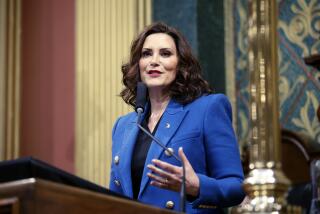Gore’s Filing Today Points to White House Run in 2000
- Share via
WASHINGTON — Vice President Al Gore, taking the first official step toward his own bid for the White House, plans to file papers today establishing a presidential campaign committee for 2000, aides said.
Though Gore has not made a formal decision to run, those around him consider his candidacy inevitable--a view that today’s filing with the Federal Election Commission will only solidify. With the campaign committee in place, aides say, Gore and his staff will intensify their efforts to organize support, and begin raising money for 2000.
“It is the first day of the season and we wanted to start the planning and the organizing,” said one senior advisor to the vice president. “The FEC says if you do those things, you need to file a committee--so we are.”
Gore’s filing will mark him as the third Democrat to formally launch a committee for the 2000 campaign. Liberal Sen. Paul Wellstone (D-Minn.) and former Sen. Bill Bradley of New Jersey have also launched exploratory committees, and signaled their intention to challenge Gore.
Three other Democrats are considering the race: Sen. John F. Kerry of Massachusetts, two-time contender Jesse Jackson and House Minority Leader Richard A. Gephardt of Missouri--though Gephardt lately has appeared more interested in leading a Democratic effort to recapture the House in 2000.
Another potentially formidable competitor, Sen. Bob Kerrey of Nebraska, recently announced he would instead run for reelection to the Senate in 2000.
Gore’s filing today will name Jose Villarreal, a leader in Texas Latino politics, as his campaign treasurer. Gore has already tapped White House political director Craig Smith, an aide to Clinton since the president’s days in Arkansas, as his campaign manager for 2000.
The vice president has also built an extensive--and some say unwieldy--team of campaign advisors that include his former chief of staff Peter Knight (Clinton’s campaign manager in 1996), his current chief of staff, Ronald Klain, and two key architects of Clinton’s message in 1996: pollster Mark Penn and media advisor Robert Squier.
In most respects, Gore will begin the race for the Democratic nomination in a commanding position. Two recent national polls showed him as the choice for 2000 of about half of all Democratic voters--more than four times as many as preferred his closest competitor, Bradley.
As the sitting vice president, he can be assured of unparalleled institutional, organizational and fund-raising support. He has also skillfully used his time in the White House to broaden his connections in the party--working closely with big-city mayors, for instance, as a key player in the administration’s urban initiatives. And he can count on steadfast support from Clinton--whose popularity in the party has soared in the face of the Republican drive to remove him from office.
“Gore’s position is very strong right now,” says Democratic consultant Tad Devine.
Those advantages may be insuperable for Gore’s rivals. Yet, much like Walter F. Mondale in 1984, some Democrats believe that Gore could yet prove vulnerable if he cannot offer a more compelling rationale for his candidacy than his seeming “inevitability.”
A highly touted recent speech to the Democratic Leadership Council--where Gore called for an agenda of “practical idealism”--fell flat, both in the hall and with many Democratic analysts.
More to Read
Get the L.A. Times Politics newsletter
Deeply reported insights into legislation, politics and policy from Sacramento, Washington and beyond. In your inbox twice per week.
You may occasionally receive promotional content from the Los Angeles Times.










